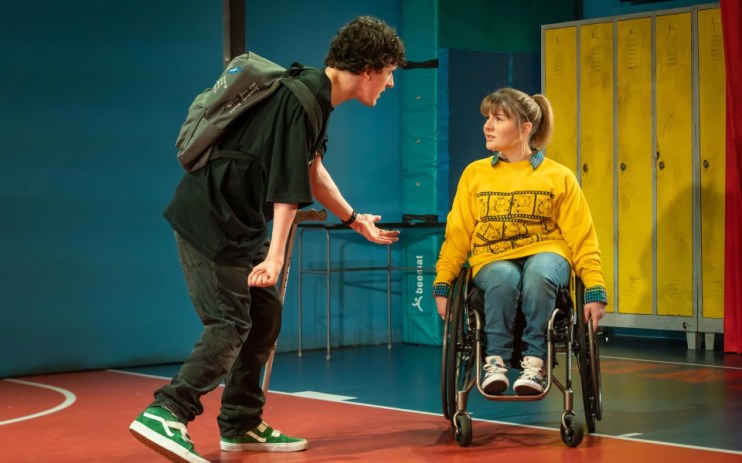Teenage Dick at the Donmar review: High school reimagining is a hit

Teenage Dick transposes Shakespeare’s murderous monarch Richard III from Plantagenet England to the halls of a modern American high school; the perfect setting for a twisted tale of ambition and resentment.
Roseland High School junior class secretary Richard’s desire for respect and attention is frustrated by his physical disability in a community that worships sporting prowess over intelligence.
But, as a keen student of Machiavelli, seemingly untrammelled by conscience, he instead seizes on wickedness as a pathway to power.
Played with evident relish by Daniel Monks, Richard is a “creepy Renaissance fair-talking weirdo”, whose recondite and anachronistic speech unsettles his classmates and is peppered with quotes from – and references to – the source material. While sometimes this is done with a degree of subtlety, others are crammed in with the deliberate provocativeness of a bad pun.
This is established at the outset, when Richard declares that “the winter formal [has given] way to glorious spring fling”, but the most egregious example is the inevitable reworking of the infamous “my kingdom for a horse” line, which is the bathetic nadir of an otherwise outstanding production.
READ MORE: How does Star Wars: The Rise of Skywalker measure up?
One area in which Teenage Dick comprehensively outshines the original is in its development of the relationship between Richard and Anne (played with great sensitivity by Siena Kelly). Here she is a fully developed character, who comes to have real feelings for Richard, and his betrayal of her is the play’s central tragedy.
Richard also speaks directly to the audience in a series of increasingly chilling soliloquies, during which the world around him snap-freezes, the stage bathed in cold white light as he leers through the fourth wall like an eldritch Zack Morris.
Mike Lew was approached to write the play by his friend, the actor Greg Mozgala, who has cerebral palsy and wanted to do a new version of Shakespeare’s Richard III, which could examine the experience of people with disabilities in a contemporary context. When Mozgala dangled the title of the prospective work in front of him, Teenage Dick proved irresistible.
The script has been reworked for this production, to take account of the differences between Mozgala’s CP and Monks’ hemiplegia. A note in the published version invites future playwrights to tweak the text to accommodate the physicality of the actors playing the roles of Richard and his wheelchair-using friend Buck, but it makes very clear that “in no case should able-bodied actors ‘play’ disabled”.
The idea that Shakespeare’s Othello is no longer an appropriate role for white actors has become widely accepted in recent years, and while there may be some distance to travel before similar assumptions coalesce around the casting of Richard III, Teenage Dick could be a significant nudge in that direction. It’s not simply an important advance in the representation of disability on stage, however, it’s a deft, witty, and thoroughly engrossing reinvention of a classic.